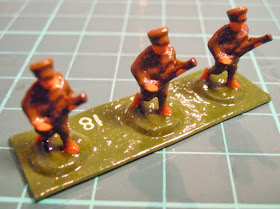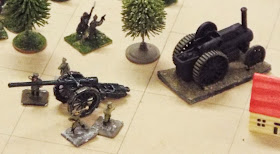One advantage of living in London is the accessibility of places like the National Archives ... although it does take an average of two hours to make the trip both there and back by car.
At present my wife and I try to visit the Archives as often as we can, and yesterday's visit was the second we have made in a fortnight. With my help she is trying to trace members of her family who served in the British Army.
During our visit I spent most of my time going through the numerical returns sent to the War Office by the commander of the independent company of Royal Invalids stationed at Landguard Fort in Felixstowe, Suffolk. The returns were sent monthly between 1760 and 1798, and contain details of how many officers and men were present.
(For most of the period that I was studying, the company had a Captain, a Lieutenant, an Ensign, three Sergeants, two Drummers, and between thirty five and ninety Other Ranks. One or more of the senior officers were absent for much of the time, and most of the Other Ranks were trained 'in the Artillery Exercise' so that they could act as gun crews for the artillery emplaced as part of the fort's defences.)
I also managed to do some research of my own. This included reading the First World War Battalion War Diaries of the 6th (Service) Battalion, Queen's Royal West Surrey Regiment, a unit in which a member of my Masonic Lodge served ... and died.
At present my wife and I try to visit the Archives as often as we can, and yesterday's visit was the second we have made in a fortnight. With my help she is trying to trace members of her family who served in the British Army.
During our visit I spent most of my time going through the numerical returns sent to the War Office by the commander of the independent company of Royal Invalids stationed at Landguard Fort in Felixstowe, Suffolk. The returns were sent monthly between 1760 and 1798, and contain details of how many officers and men were present.
(For most of the period that I was studying, the company had a Captain, a Lieutenant, an Ensign, three Sergeants, two Drummers, and between thirty five and ninety Other Ranks. One or more of the senior officers were absent for much of the time, and most of the Other Ranks were trained 'in the Artillery Exercise' so that they could act as gun crews for the artillery emplaced as part of the fort's defences.)
I also managed to do some research of my own. This included reading the First World War Battalion War Diaries of the 6th (Service) Battalion, Queen's Royal West Surrey Regiment, a unit in which a member of my Masonic Lodge served ... and died.






































































































